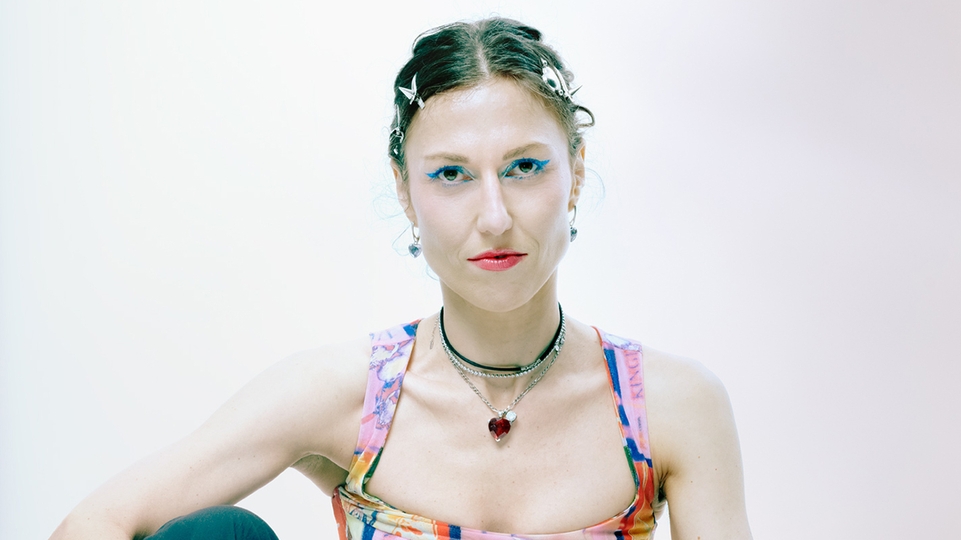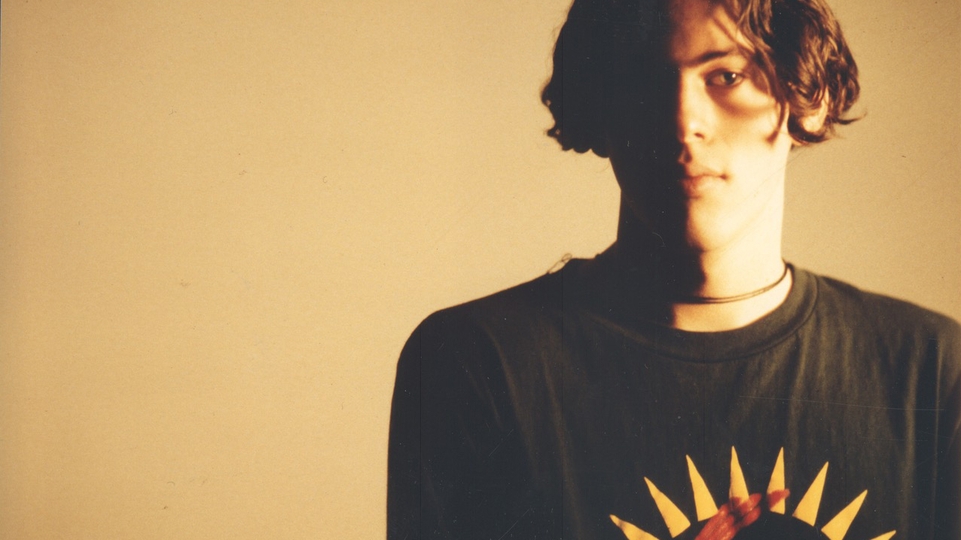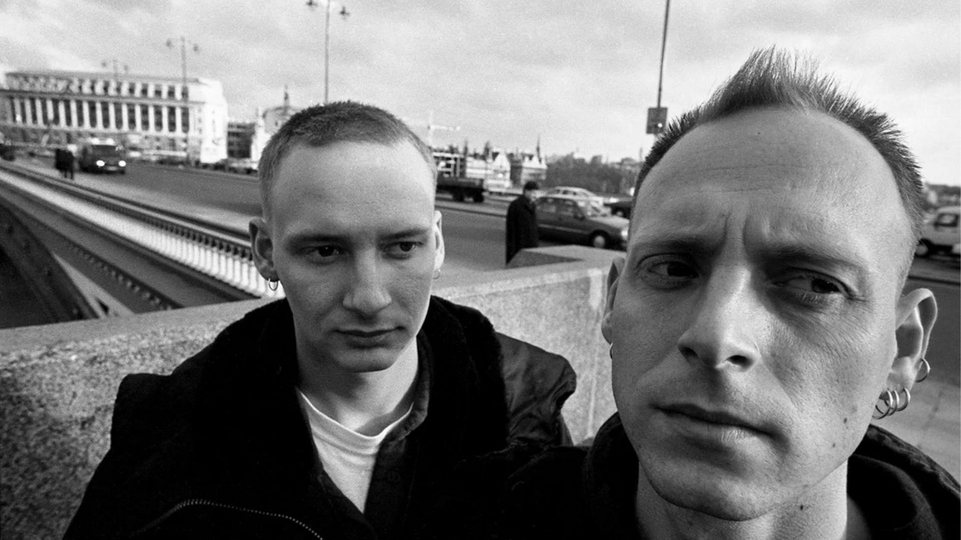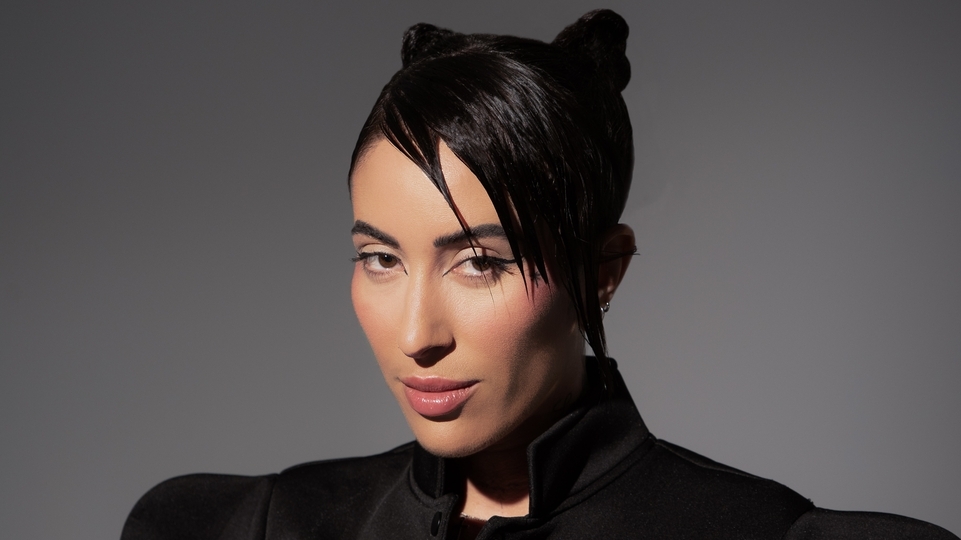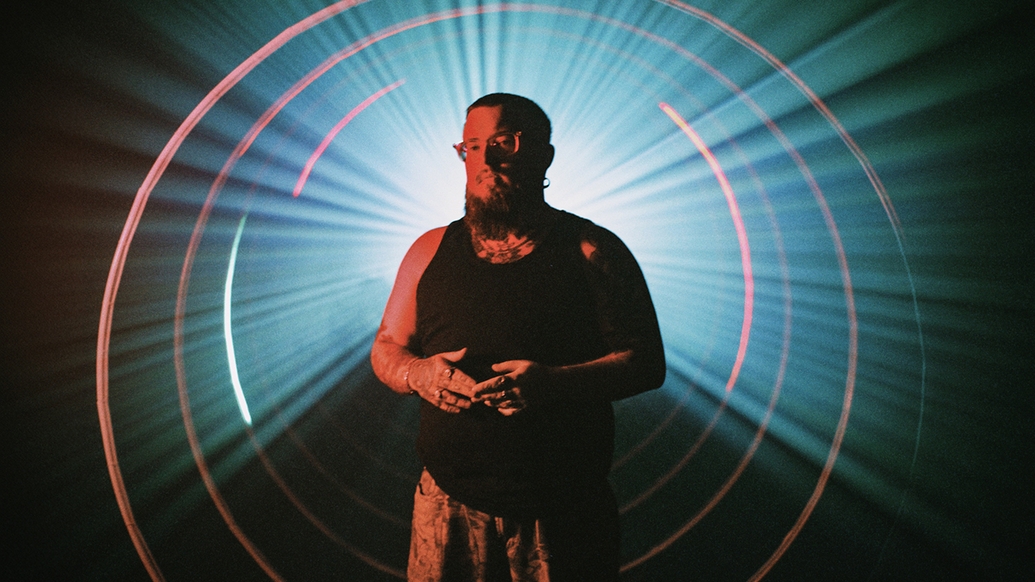
Recognise: RIOT CODE
Over the past three years, the name RIOT CODE has become synonymous with a strain of hard, fast techno, landing on labels like Noise Manifesto, HOMAGE and NineTimesNine and hammered out at parties like Teletech. Formerly a duo, the Derry-based project is now an individual venture for Oliver Grant, who’s ready to lift the trademark mask and take things to the next level. Alongside a storming Recognise mix that capture’s RIOT CODE’s past, present and future sounds, he speaks to Olivia Stock about going solo, navigating the techno scene as a trans artist, and what the future holds
It’s New Year’s Eve 2023 in Belfast’s Bone Yard, and Oliver Grant is overthinking. After spending the previous two weeks restlessly rifling through his collection, prepping his USBs with a peak-time-ready batch of hard techno, the Northern Irish DJ is about to step on stage and make his solo debut as RIOT CODE. Up until three weeks ago, this headline slot would have been shared with his friend and collaborator Stephen Doherty, with whom he spent three years building a profile rooted in strident sets, tough-as-nails productions and a masked visage. Now, as he steps up to the decks, face in full view, the lights feel brighter than usual. It's strange, but as the kickdrums thunder and the basslines heave through this tent of eager ravers, he realises he’s in his element, ready to reintroduce himself as RIOT CODE 2.0
It’s a few months later when DJ Mag catches up with Oliver over Zoom. He’s back home in Derry, fresh from tearing up Dublin’s Index – “a really, very cool club” – alongside close pal and mentor, Paula Temple. Reflecting on that symbolic gig in Belfast, Oliver acknowledges the nerves he’d felt about “going solo”, but it’s a change he’s quickly come to relish. “I’m obviously so used to playing with someone else, so at first I was completely overcompensating – making sure I had enough tracks, enough ideas, this and that,” he remembers. “Though I personally felt like it flowed a lot better, because I was feeding off myself and concentrating on what I was doing, and I knew that everything I had lined up was fresh music. Since then I’ve really, really enjoyed the process of transitioning into a solo artist.”
Like many creative projects, RIOT CODE originated in the early days of the pandemic. Oliver – then in his early 20s – had been working as a photographer/videographer in NI, working and touring shows with the likes of Mall Grab and KETTAMA, before getting his hands on his own pair of decks when Covid permitted him the spare time. “It was just supposed to be something for us to do in the middle of lockdown. I’m one of those people that needs a routine and a sense of purpose, or my mental health will be like ‘AHHHH’,” he says, miming an explosion with his hands. “Now we’re here, and it’s going alright.”
“Going alright” is quite the understatement when you consider RIOT CODE’s trajectory in the years since. After finding their feet with the chunky electro of their debut two-tracker, ‘DRIVE TRIBE’, in the spring of 2020, the duo went on to hone their hard-edged techno sound across a slew of acclaimed EPs and singles for labels like NineTimesNine and ELIXYR, bagging co-signs from tastemakers including VTSS, SPFDJ, and Amelie Lens. By late 2022, a sense of hysteria was bubbling around Northern Ireland’s hottest hard dance torchbearers, and RIOT CODE were landing major sets at venues like Belfast’s Telegraph Building and Emerge Festival – “people were sprinting to get in” – as well as working with promoters like Teletech and SHINE. “It really wasn’t bad for two Derry boys,” he laughs.
Oliver doesn’t dwell too much on the reasons behind his and Doherty’s decision to go their separate ways – “we were just moving in very different directions and wanted different things” – but it’s clear that, creatively, he’s now entered a new zone of confidence with what he’s doing. “These past couple of gigs I’ve been coming away like, ‘fuck, I smashed that’, feeling really good about it. I’ve been getting some great feedback too; some people have reached out saying they can really hear the progression and the flow, and it’s like, ‘okay, I’m doing something right here. I can roll with that’.”
“Over the past three years, the music has done what it needed to do,” he continues. “But now the masks have dropped and it’s time to get personal.”
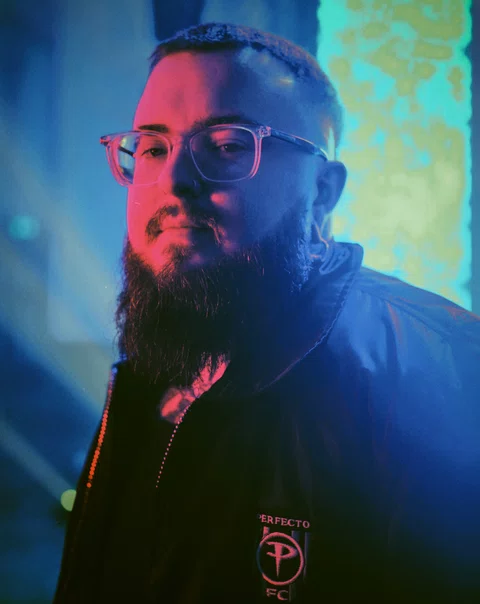
With this new phase of RIOT CODE has come an openness to exploring new styles, tempos and textures. “I always say that as an artist you’re a painter, and you should be able to experiment with different shades and colours,” Oliver explains.
It’s a sentiment that is reflected in RIOT CODE’s Recognise mix, which introduces lightning flashes of various styles that have resonated with him over the years – trance, acid, breaks – into its thundering blend of techno beats. “This mix was a really personal one for me,” he smiles. “I’ve made it in a way that kind of explains my progression on a personal level: what I grew up listening to, and where I find my ear going when I think about what to put on when I’m out with mates or something... It felt good to go back and dig through what I used to listen to.”
It’s a more varied vibe he intends to carry into his club sets going forward too. “I just have this thing where I want my sets to be a journey,” he says. “I don’t know if it’s because I’ve been on such a journey myself, but if I’m going to keep people in a room for three hours, maybe more, you need those ups and downs or you lose them.
“Previously, when we were a duo, we used to start at maybe 148, 150 BPM,” he adds. “Now, I’m starting at 140 and staying there for maybe 30 minutes and then moving to 142 for another 20 minutes. It’s a lot more gradual, I don’t feel like there’s that rush.”
Though RIOT CODE has traditionally been synonymous with tough, propulsive techno, Oliver does make it clear that there have always been emotional threads in his music. “Of course, there are some tracks that are more dancefloor-ready, but if you dig a bit deeper into where RIOT CODE started, it’s proper emotive stuff,” he explains.
He points to the first track he and Doherty ever made together, an edit of Oklou’s dreamy, experimental pop cut ‘Level 5’, the original mix of which he first became obsessed with after hearing it in Avalon Emerson’s set at AVA Festival 2019. “I was looking everywhere for that track, and then I came across it when I was playing a Playstation game, and it ended up being the first edit we ever released. That track had a proper emotional weight to it, and I’ve tried to capture that with a lot of our releases since.”
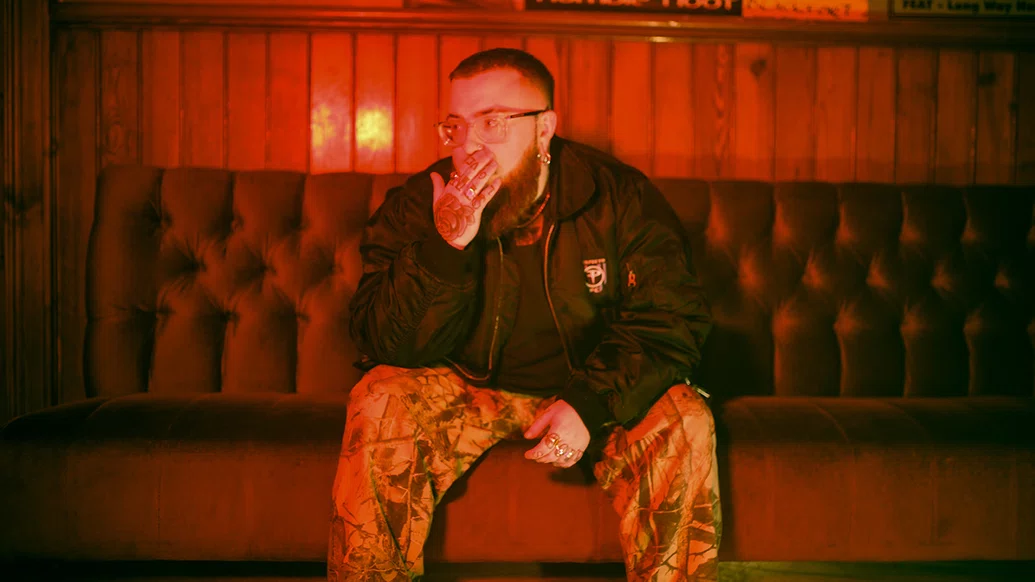
“My thing for RIOT CODE has always been that it shouldn’t be boxed off. The hard techno scene isn’t where I want to live, eat and breathe, or whatever, I want – I need – to be an artist that can grow and experiment.”
Among RIOT CODE’s biggest supporters has been Paula Temple, who fell in love with the duo’s output after hearing their earliest demo tracks. A luminary of the techno scene, Temple took the duo warmly under her wing in 2021. Two years later, RIOT CODE released their EP, ‘Anam Cara’ via her Noise Manifesto label. Translating from Gaeilge to mean ‘Soul Friend’, the euphoric body of work is dedicated to their kinship, with the three-tracker ending on a remix by Temple herself.
Temple has also been a supportive figure for Oliver on a personal level; her compassion as a fellow queer person in dance music has been invaluable in his own journey. Oliver is trans, and while RIOT CODE’s successes to date have been monumental, the challenges, both personal and practical, that come with navigating the industry as an LGBTQ+ artist are something he’s well acquainted with. “We played our debut Australian shows two months after I had top surgery,” he remembers, “and that was the first time having to tour without binders, and having to be careful if I was going near or under the water. It was a really difficult time.”
The rest of RIOT CODE’s 2023 tour schedule was configured to factor in whether countries were cool enough for Oliver to be comfortable in during his recovery. “Stuff like that is so overlooked,” he says. “Nobody really considers the impact of playing in hot countries on trans people, and that they can only tour at certain times of the year when it’s not too warm if they’re binding or recovering from surgery and things like that.”
He recalls another occasion when they had to catch a connecting flight through Qatar, around the same time as the World Cup. “I had to be really careful, even in terms of what I was packing in my suitcase,” he remembers. “Stuff like that you can be imprisoned for – for being trans. Stuff like that cis people don’t even think about, you know... But that’s the reality of touring as a trans person. At that point we were also wearing masks, so it was already difficult to breathe.”
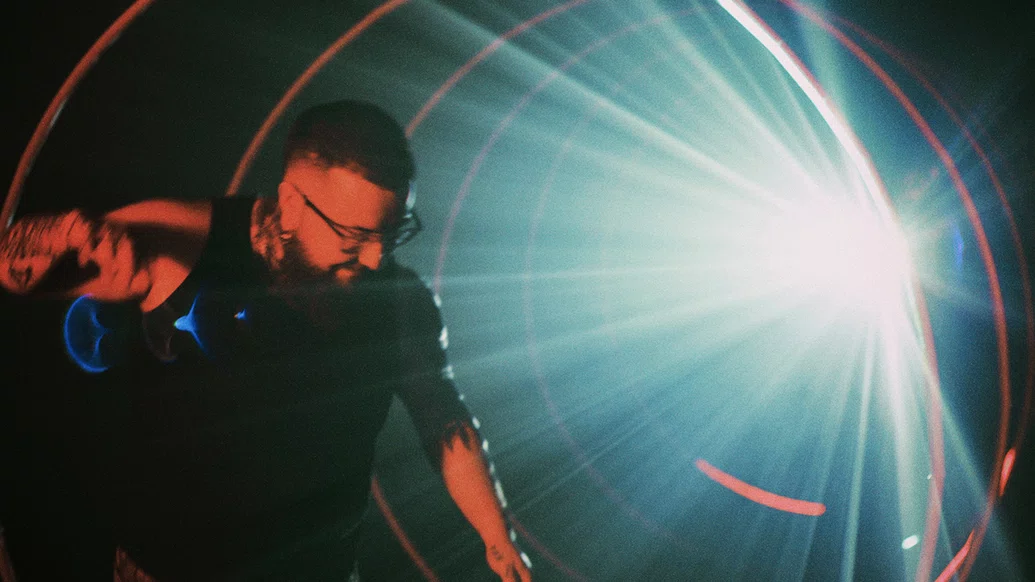
As Oliver sees it, there’s a lot of work still to be done in dance music spaces to accommodate trans artists and ravers. “I still think that venues have such a long way to go,” he says. “The unisex toilets are a start, obviously that’s great, but we could be doing a lot more to be inclusive...”
Though the Irishman is all too aware of the discrimination and “locker room talk” that’s rife within the industry and beyond, the music community he has found himself in has been safe haven throughout his transition because, as he puts it, “nobody really gives a fuck”. “It’s just listen to whatever you want, be whoever you want, simple as,” Oliver says. “If we’ve all come together under that same roof, that’s enough. We have something in common already. I feel like there’s enough space for everybody to go around, and I’ve fitted into that room somehow.”
This is the personal sort of approach that Oliver intends to bring into RIOT CODE’s music going forward – and there’s a lot of it on the way. “I’ve got three EPs coming out – two four-track EPs, and then an eight-to-12 track album at the end of the year,” he reels off, eyes glinting. That’s not to mention the slew of remixes in the works – “some I’m still looking for the right label for” – and RIOT CODE’s slammed gig schedule, with highlights including Terminal V festival, and an appearance at RSO.BERLIN’s Gegen Glory party alongside Charlie Sparks, Amanda Mussi, and more. “It’s RIOT CODE going up another gear really,” Oliver confirms.
How this newly unmasked musician has managed to carve out RIOT CODE’s lane in the genre’s hard, fast and fierce underground, whilst also navigating personal and professional changes, is anyone’s guess. But what’s certain is that there is nothing that can stand in the way of the project’s new phase. “My thing for RIOT CODE has always been that it shouldn’t be boxed off. The hard techno scene isn’t where I want to live, eat and breathe, or whatever, I want – I need – to be an artist that can grow and experiment.”
Listen to RIOT CODE’s Recognise mix below.
